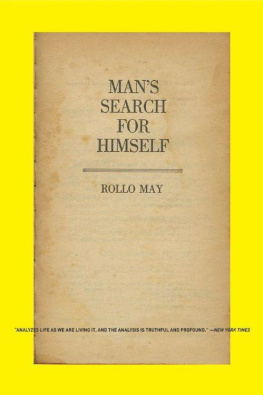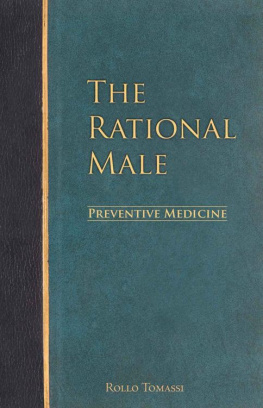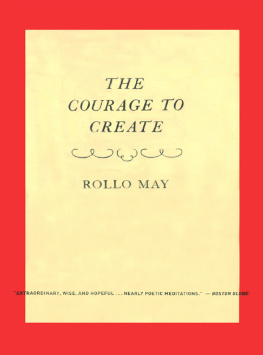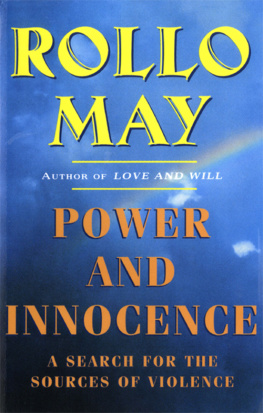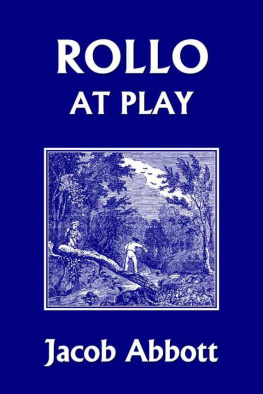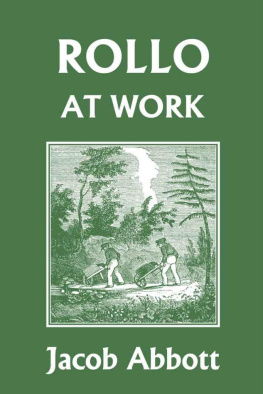THE
COURAGE TO
CREATE
BY ROLLO MAY
IN NORTON PAPERBACK
The Courage to Create
The Discovery of Being
Psychology and the Human Dilemma
The Meaning of Anxiety
Power and Innocence
Freedom and Destiny

Contents
A LL MY LIFE I have been haunted by the fascinating questions of creativity. Why does an original idea in science and in art pop up from the unconscious at a given moment? What is the relation between talent and the creative act, and between creativity and death? Why does a mime or a dance give us such delight? How did Homer, confronting something as gross as the Trojan War, fashion it into poetry which became a guide for the ethics of the whole Greek civilization?
I have asked these questions not as one who stands on the sidelines, but as one who himself participates in art and science. I ask them out of my own excitement, for example, at watching two of my colors on a paper merge into an unpredictable third color. Is it not the distinguishing characteristic of the human being that in the hot race of evolution he pauses for a moment to paint on the cave walls at Lascaux or Altamira those brown-and-red deer and bison which still fill us with amazed admiration and awe? Suppose the apprehension of beauty is itself a way to truth? Suppose that eleganceas the word is used by physicists to describe their discoveriesis a key to ultimate reality? Suppose Joyce is right that the artist creates the uncreated conscience of the race?
These chapters are a partial record of my ponderings. They had their birth as lectures given at colleges and universities. I had always hesitated to publish them because they seemed incompletethe mystery of creation still remained. I then realized that this unfinished quality would always remain, and that it is a part of the creative process itself. This realization coincided with the fact that many people who had heard the lectures urged that they be published.
The title was suggested by Paul Tillichs The Courage to Be, a debt I am glad to acknowledge. But one cannot be in a vacuum. We express our being by creating. Creativity is a necessary sequel to being. Furthermore, the word courage in my title refers, beyond the first few pages of the first chapter, to that particular land of courage essential for the creative act. This is rarely acknowledged in our discussions of creativity and even more rarely written about.
I want to express my gratitude to several friends who have read all or part of the manuscript and have discussed it with me: Ann Hyde, Magda Denes, and Elinor Roberts.
More than is usually the case, this book was a delight to compile, for it gave me cause to ponder all these questions over again. I only hope the book gives as much pleasure to the reader as it did to me in the compiling of it.
Rollo May
Holderness, New Hampshire

W E ARE living at a time when one age is dying and the new age is not yet born. We cannot doubt this as we look about us to see the radical changes in sexual mores, in marriage styles, in family structures, in education, in religion, technology, and almost every other aspect, of modern life. And behind it all is the threat of the atom bomb, which recedes into the distance but never disappears. To live with sensitivity in this age of limbo indeed requires courage.
A choice confronts us. Shall we, as we feel our foundations shaking, withdraw in anxiety and panic? Frightened by the loss of our familiar mooring places, shall we become paralyzed and cover our inaction with apathy? If we do those things, we will have surrendered our chance to participate in the forming of the future. We will have forfeited the distinctive characteristic of human beingsnamely, to influence our evolution through our own awareness. We will have capitulated to the blind juggernaut of history and lost the chance to mold the future into a society more equitable and humane.
Or shall we seize the courage necessary to preserve our sensitivity, awareness, and responsibility in the face of radical change? Shall we consciously participate, on however small the scale, in the forming of the new society? I hope our choice will be the latter, for I shall speak on that basis.
We are called upon to do something new, to confront a no mans land, to push into a forest where there are no well-worn paths and from which no one has returned to guide us. This is what the existentialists call the anxiety of nothingness. To live into the future means to leap into the unknown, and this requires a degree of courage for which there is no immediate precedent and which few people realize.
1. WHAT IS COURAGE?
This courage will not be the opposite of despair. We shall often be faced with despair, as indeed every sensitive person has been during the last several decades in this country. Hence Kierkegaard and Nietszche and Camus and Sartre have proclaimed that courage is not the absence of despair; it is, rather, the capacity to move ahead in spite of despair.
Nor is the courage required mere stubbornnesswe shall surely have to create with others. But if you do not express your own original ideas, if you do not listen to your own being, you will have betrayed yourself. Also you will have betrayed our community in failing to make your contribution to the whole.
A chief characteristic of this courage is that it requires a centeredness within our own being, without which we would feel ourselves to be a vacuum. The emptiness within corresponds to an apathy without; and apathy adds up, in the long run, to cowardice. That is why we must always base our commitment in the center of our own being, or else no commitment will be ultimately authentic.
Courage, furthermore, is not to be confused with rashness. What masquerades as courage may turn out to be simply a bravado used to compensate for ones unconscious fear and to prove ones machismo, like the hot fliers in World War II. The ultimate end of such rashness is getting ones self killed, or at least ones head battered in with a policemans billy clubboth of which are scarcely productive ways of exhibiting courage.
Courage is not a virtue or value among other personal values like love or fidelity. It is the foundation that underlies and gives reality to all other virtues and personal values. Without courage our love pales into mere dependency. Without courage our fidelity becomes conformism.
The word courage comes from the same stem as the French word coeur, meaning heart. Thus just as ones heart, by pumping blood to ones arms, legs, and brain enables all the other physical organs to function, so courage makes possible all the psychological virtues. Without courage other values wither away into mere facsimiles of virtue.
In human beings courage is necessary to make being and becoming possible. An assertion of the self, a commitment, is essential if the self is to have any reality. This is the distinction between human beings and the rest of nature. The acorn becomes an oak by means of automatic growth; no commitment is necessary. The kitten similarly becomes a cat on the basis of instinct. Nature and being are identical in creatures like them. But a man or woman becomes fully human only by his or her choices and his or her commitment to them. People attain worth and dignity by the multitude of decisions they make from day by day. These decisions require courage. This is why Paul Tillich speaks of courage as
Next page

